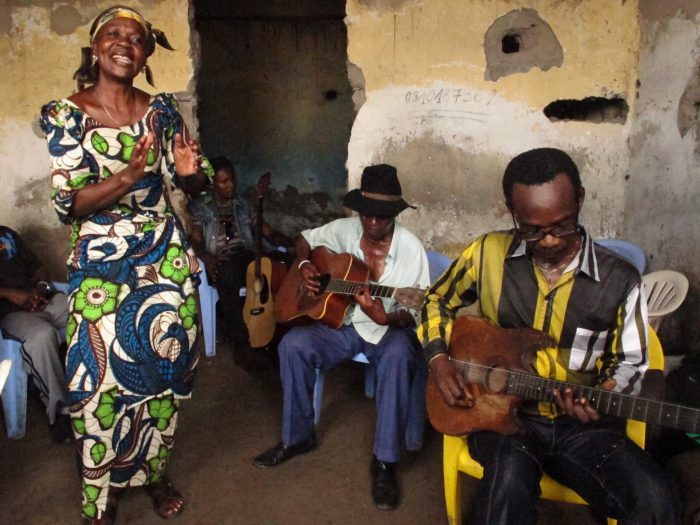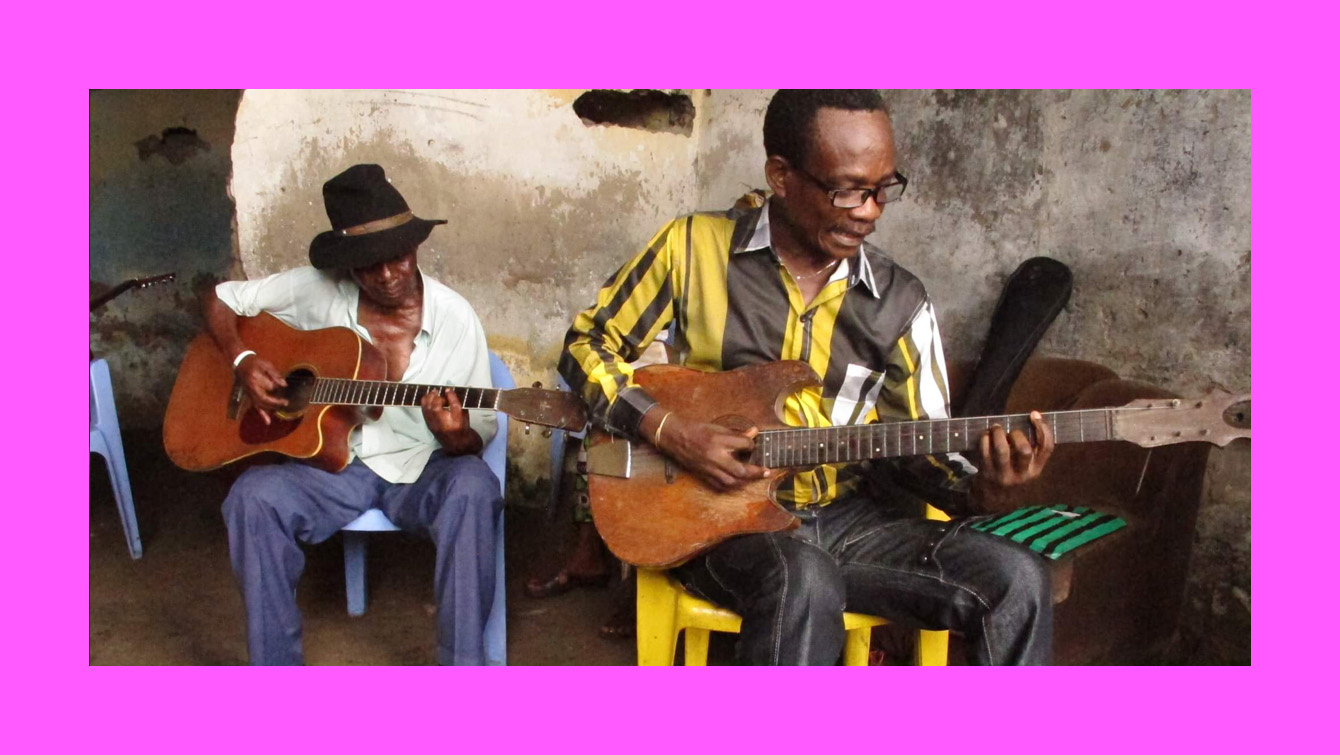Historical paths and political functions of Congolese rumba.
Lecture and presentation by Romain Malwengo Kingenzi with following discussion
Hopscotch Reading Room - Free admission - Start 7 pm
When we speak of Congolese music, we are talking first and foremost about the rumba, which has become its characteristic musical identity. This rumba, which was originally the dance of the belly button among the Congos, has benefited from mixing and diverse contributions and has been enriched by other currents from Africa such as high life, from Cuba such as patchanga or bolero, from America such as rock and blues, and so on. Add to all this the sum of local dances and dances from West Africa and some European expressions like the piqué polka and the bolero resulting in a multitude of influences emancipating and rebelling against the cultural paternalization of the Colonizers.
The Musicologist Romain Malwengo Kingenzi will share his research about different aspects of Rumba: Cultural factors such as the adoption of Afro-Cuban rhythms, the influence of black African music, the promotion of inter-tribal languages, evangelisation and schooling in the country, economic factors such as the formation of urban settlements, communication channels, industrial factors, the appearance of the first orchestras, recording studios and publishing houses, the introduction of musical instruments, the advent of the phonograph and the 78 record, the use of radio, bars and dance clubs, associations and fan clubs.
In a following discussion the artists of Laboratoire Kontempo will present and share their personal histories and memories of Congolese Rumba putting into discussion the formative moment the music meant in shaping the congolese self identification after colonialism.
Romain Malwengo Kingenzi, was born 1957 in Masi-Manimba (D.R. Congo). He lives and works in Kinshasa where he is Head of the Music Section and a teacher at the National Institute of Arts in Kinshasa (INA).
Focusing on Ethnomusicology and Political Communication through music, his research field revolves around Congolese music, both modern and traditional. In addition, he is currently preparing a postgraduate degree at the Institut Facultaire des Sciences de l'Information et de la Communication (IFASIC) on the theme of "Political expression through modern Congolese music under the second republic".
Artistic Director of the Chamber Orchestra and the Choir of the I.N.A. since 2008, he taught music, drawing and aesthetics at the Collège Saint Joseph Elikya in Kinshasa from 1987 to 2008. Representative of the DRC at the first edition of the African Music Forum in Segou, Mali in 2016, member of the Rumba Commission of the Democratic Republic of Congo for its recent inscription among the cultural heritages of UNESCO.

Image courtesy: Artists: Bakolo Music International rehearsing at their headquarters in Bumbu, Kinshasa. Guitar: Bikunda Nzoku Moko Buele, Lead guitar: Michel Vula Diankatu, Danse: Isabelle Masamboda Copyright : Jeanne Vu Van
Historische Wege und politische Funktionen der kongolesischen Rumba.
Vortrag und Präsentation von Romain Malwengo Kingenzi
Hopscotch Reading Room - 19 Uhr - Eintritt Frei
Wenn wir von kongolesischer Musik sprechen, meinen wir in erster Linie die Rumba, die zur charakteristischen musikalischen Identität des Landes geworden ist. Dieser Rumba, der ursprünglich der Tanz des Bauchnabels innerhalb der kongolesischen Bevölkerung war, hat von einer Vielzahl unterschiedlicher Impulse profitiert und wurde durch andere Strömungen aus Afrika (z. B. High Life), aus Kuba (z. B. Patchanga oder Bolero), aus Amerika (z. B. Rock und Blues) und so weiter bereichert. Hinzu kommen lokale Tänze und Tänze aus Westafrika sowie einige europäische Ausdrucksformen wie die Piqué-Polka und der Bolero, was zu einer Vielzahl von Einflüssen führt, die sich von der kulturellen Bevormundung durch die Kolonisatoren emanzipieren und dagegen auflehnen.
Der Musikwissenschaftler Romain Malwengo Kingenzi wird seine Forschungen über verschiedene Aspekte der Rumba vorstellen: Kulturelle Faktoren wie die Übernahme afrokubanischer Rhythmen, der Einfluss schwarzafrikanischer Musik, die Förderung der Sprachen zwischen den Stämmen, die Evangelisierung und das Schulwesen im Land, wirtschaftliche Faktoren wie die Entstehung städtischer Siedlungen, Kommunikationskanäle, industrielle Faktoren, das Auftreten der ersten Orchester, Aufnahmestudios und Verlage, die Einführung von Musikinstrumenten, das Aufkommen des Phonographen und der 78er-Schallplatte, die Nutzung des Radios, Bars und Tanzclubs, Vereinigungen und Fanclubs.
In einer anschließenden Diskussion werden die Künstler des Laboratoire Kontempo ihre persönlichen Geschichten und Erinnerungen an den kongolesischen Rumba vorstellen und zur Diskussion stellen, welchen prägenden Moment die Musik bei der Gestaltung der kongolesischen Selbstidentifikation nach dem Kolonialismus bedeutete.
Romain Malwengo Kingenzi, wurde 1957 in Masi-Manimba (D.R. Kongo) geboren. Er lebt und arbeitet in Kinshasa, wo er Leiter der Musikabteilung und Lehrer am Nationalen Institut für Kunst in Kinshasa (INA) ist.
Sein Forschungsschwerpunkt liegt auf Ethnomusikologie und politischer Kommunikation durch Musik, wobei er sich auf moderne und traditionelle kongolesische Musik konzentriert. Darüber hinaus bereitet er derzeit ein Postgraduiertenstudium am Institut Facultaire des Sciences de l'Information et de la Communication (IFASIC) zum Thema "Politischer Ausdruck durch moderne kongolesische Musik in der zweiten Republik" vor.
Seit 2008 ist er künstlerischer Leiter des Kammerorchesters und des Chors des I.N.A. Von 1987 bis 2008 unterrichtete er Musik, Zeichnen und Ästhetik am Collège Saint Joseph Elikya in Kinshasa. Vertreter der Demokratischen Republik Kongo bei der ersten Ausgabe des Afrikanischen Musikforums in Segou, Mali, 2016, Mitglied der Rumba-Kommission der Demokratischen Republik Kongo für die kürzlich erfolgte Aufnahme der Rumba in das UNESCO-Kulturerbe.
